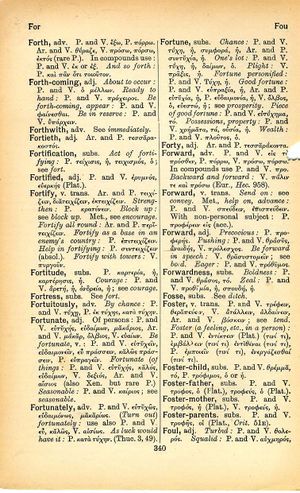forward: Difference between revisions
From LSJ
(CSV4) |
m (Text replacement - "<b class="b2">Hec.</b>" to "''Hec.''") |
||
| Line 3: | Line 3: | ||
P. and V. εἰς τὸ [[πρόσθεν]], P. [[πόρρω]], V. [[πρόσω]], [[πόρσω]]. | P. and V. εἰς τὸ [[πρόσθεν]], P. [[πόρρω]], V. [[πρόσω]], [[πόρσω]]. | ||
In compounds use P. and V. πρό. | In compounds use P. and V. πρό. | ||
<b class="b2">Backward and forward</b>: V. [[πάλιν]] τε καὶ [[πρόσω]] (Eur., | <b class="b2">Backward and forward</b>: V. [[πάλιν]] τε καὶ [[πρόσω]] (Eur., ''Hec.'' 958). | ||
'''v. trans.''' | '''v. trans.''' | ||
<b class="b2">Send on</b>: see [[convey]]. | <b class="b2">Send on</b>: see [[convey]]. | ||
Revision as of 11:51, 7 August 2017
English > Greek (Woodhouse)
adv.
P. and V. εἰς τὸ πρόσθεν, P. πόρρω, V. πρόσω, πόρσω. In compounds use P. and V. πρό. Backward and forward: V. πάλιν τε καὶ πρόσω (Eur., Hec. 958). v. trans. Send on: see convey. Met., help on, advance: P. and V. σπεύδειν, ἐπισπεύδειν. With non-personal subject: P. προφέρειν εἰς (acc.). adj. Precocious: P. προφερής. Pushing: P. and V. θράσυς, ἀναιδής, V. πρόλεσχος. Be forward in speech: V. θρασυστομεῖν; see bold. Eager: P. and V. πρόθυμος.

